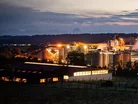Smurfit Kappa's project for providing sustainable heating

Since 2005, Smurfit Kappa has been extremely active in tackling its carbon footprint with a successful emissions reduction of 37.3% across its paper and board mills. The Dublin-based company—with operations across Europe and America—is also actively involved in seeking out sustainable packaging options. An important focus for mitigating the business’ effect on the environment is its latest project that is taking place at its Nettingsdorf Paper Mill in Austria.
The project will see the construction of a new heat extraction facility at the mill, which will utilise the residual heat from its operations and turn it into a sustainable district heating source for the local community of Ansfelden. The project is a joint venture between Smurfit Kappa and Bioenergie Group—specialist biomass and waste management through innovative solutions that contribute to a circular economy—and its construction has already begun at the site.
Smurfit supports local development and sustainability
The project is not the first contribution that Smurfit Kappa has made. A further project was recently completed at the Nettingsdorf Mill, Future Energy Plant, investing €134mn in a new state-of-the-art recovery boiler capable of reducing emissions and dependence on fossil fuels. The latest heat extraction project, once fully functional, will capture heat and distribute the 25 megawatts of generated heat across networks connected to 10,000 households in the surrounding Ansfelden community, as a sustainable, constant source of energy.
‘As a result of this project, we will feed into an untapped energy potential at the mill in Nettingsdorf. Together with Smurfit Kappa, we will be able to provide an environmentally friendly form of energy to thousands of households, eliminating the need to burn fossil fuels and save a significant amount of carbon dioxide in the process’, says Jakob Edler, Managing Director of Bioenergie Group.
Once the project becomes operational, it will give important insight into another solution for responsible energy sourcing. ‘This project is another important step forward in advancing sustainability here at our mill in Nettingsdorf. We will capture the waste heat in the most environmentally friendly way possible, to significantly reduce the discharge of heat into the environment’, says Günter Hochrathner, Chief Executive Officer of Smurfit Kappa Nettingsdorf.
‘We anticipate that this will significantly reduce the CO2 emissions of the surrounding district by as much as 20,000 tonnes per annum’.



